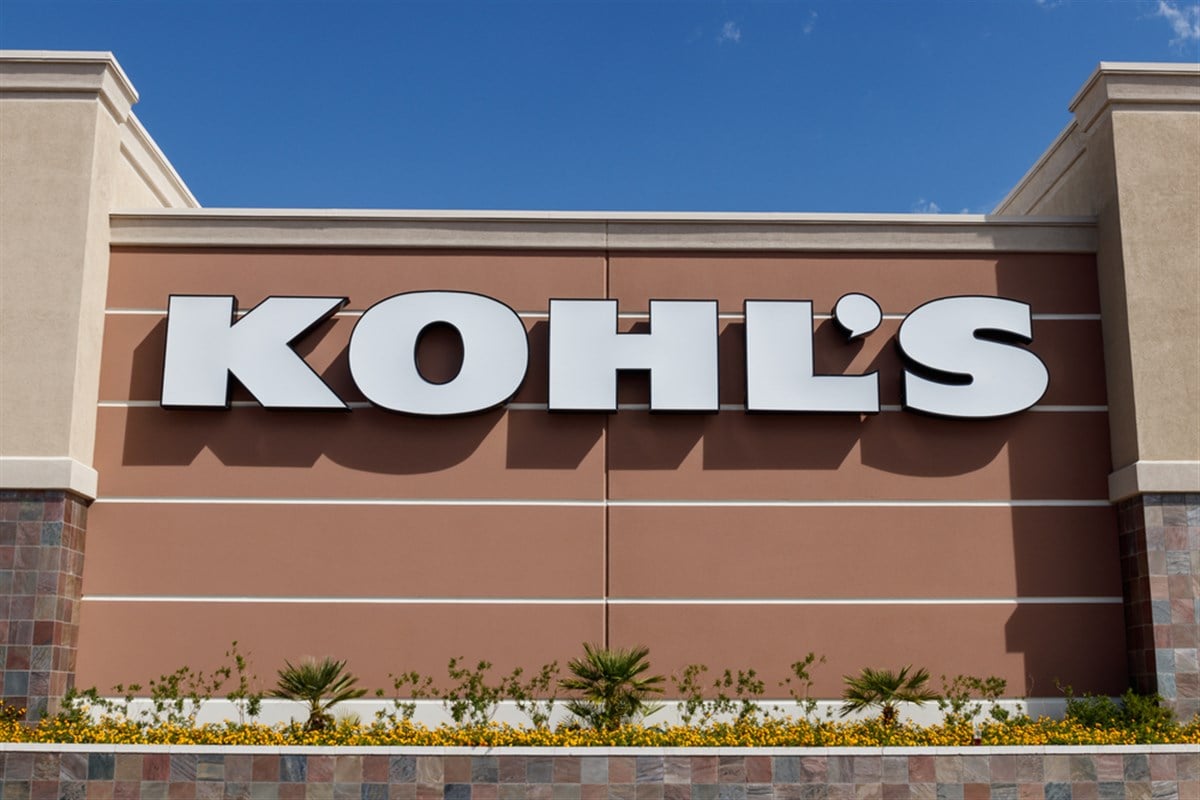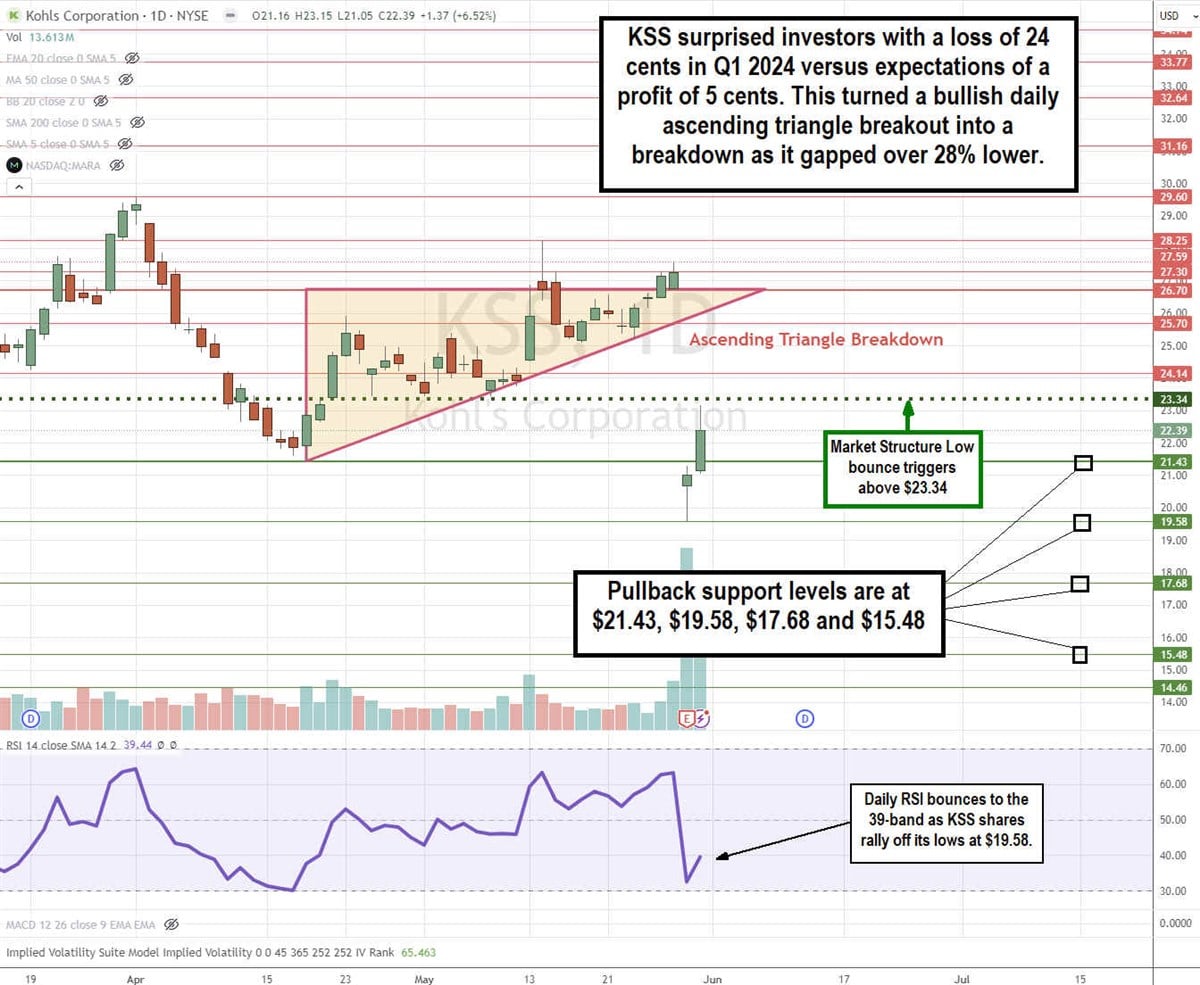
Department store operator Kohl’s Co. (NYSE: KSS) shocked investors by reporting a loss of 24 cents versus expectations of a profit of 5 cents in its first quarter 2024 earnings report. To compound matters, the company also trimmed its full-year EPS forecasts. Shares reacted by gapping down over 28% the following morning to a low of $19.58. However, shares recovered some losses back to the $22 level. Investors wonder if an investment in Kohl’s stock is dead money, but they should remember that the value of its real estate holdings alone is higher than its current market cap.
Kohl’s competes in the consumer discretionary sector with other department stores, including Target Co. (NYSE: TGT), Walmart Inc. (NYSE: WMT), TJX Co. (NYSE: TJX), and Macy’s Inc. (NYSE: M).
Kohl's Faces an Inventory Glut Dilemma
The disturbing element of Kohl’s report was that the company was on track to continue its recovery as inventory levels were NYSE: TJX">normalizing. Inventory glut has been the top killer of margins for retailers in the post-pandemic era. Inventories bloated from retailers administering an abundance of caution not to be caught short-supplied like they were during the pandemic reopening triggered by global supply chain disruptions.
Kohl's produced massive amounts of merchandise, expecting consumers to load up at full price. Unfortunately, high inflation and weakening consumer demand for goods resulted in being stuck with a large excess supply that had to be discounted through promotions to unload. This cut into gross margins, which resulted in higher sales but lower profits. By 2023, many retailers, including Kohl's, had normalized their inventory levels and were on the rebound. However, the problem wasn't inventory but rather consumer demand.
Kohl's is Sitting on $8 Billion in Real Estate
The market capitalization for Kohl's is $2.48 billion. The company owns over 400 locations, including the underlying real estate. The value of this property was estimated at between $7 billion to $8 billion during the takeover bidding wars in 2022. There is real value in the shares at these levels, especially with an 8.93% annual dividend yield. The current price-earnings (PE) stands around 9 with a massive 33.7% short interest, which could be a powder keg for a short squeeze.
KSS Reverses an Ascending Triangle into a Breakdown of Earnings
The daily candlestick chart on KSS looked bullish heading into its Q1 2024 earnings report. An ascending triangle breakout pattern formed on the earnings day, supported by higher lows. Unfortunately, the shockingly bad report caused shares to reverse and gap down over 28% the following morning. The ascending triangle breakout was no more as it broke down. After the initial panic, buyers came into the stock, rallying it back up as high as $23.15. The daily relative strength index (RSI) also bounced near the oversold 30-band. Pullback support levels are at $21.43, $19.58, $17.68, and $15.48.
Kohl's Q1 2024 Earnings Report Reveals Unexpected Loss
Kohl's reported its Q1 2024 earnings report on May 30, 2024. The company posted a surprising loss of 24 cents versus a profit of 5 cents consensus estimates, resulting in a 29-cent miss. Net loss was $27 million. Revenues fell 10.4% YoY to $3.20 billion, which is missing estimates for $3.41 billion. Net sales fell 5.3%. Comparable sales fell 4.4% YoY. On the bright side, inventory levels fell 13% YoY to $3.1 billion, and gross margin improved by 48 bps. The Board of Directors declared a quarter cash dividend of 50 cents payable on June 26, 2024, to shareholders of record on June 12, 2024.

Full Year 2024 Forecasts for Kohl's Aren’t Too Shocking
Kohl’s updated its 2024 forecasts. Net sales are expected to fall 2% to 4%, comparable sales are expected to decrease 1% to 3%, and operating margin is expected to be in the range of 3% to 3.5%. The company expects diluted EPS between $1.25 and $1.85. Kohl's expects to spend around $500 million in capital expenditures, which include expanding its Sephora partnership.
Kohl's CEO Believes Things Are Improving
Kohl’s CEO Tom Kingsbury admits the company didn’t meet internal expectations, but this quarter is not indicative of the direction they’re headed with their strategic initiatives. In fact, they expected Q1 to be the toughest quarter of the year due to last year's elevated clearance activity, which accounted for more than 600 bps of drag on comp sales in Q1.
Kingsbury pointed out regular-price sales had increased YoY, with early success in underpenetrated categories. Positive trends emerged in its Women's business, and Sephora store-within-a-store still showed robust activity. Gross margins rose 48 bps, while inventories continued to shrink 13% YoY.
Middle-Income Consumers Are Hurting
Kingsbury notes that its high-income customers' spending is steady, and middle-income customers are still hurting due to economic headwinds, including high interest rates and inflation. Kingsbury commented, “In this environment, we are working hard to deliver even more value, recognizing that our customers' discretionary spending is pressured. Part of this is having a strong private brand portfolio, which positions us well as consumers looking for value.”
Kingsbury concluded, “While navigating what remains a challenging consumer backdrop, we remain focused on executing against our four strategic priorities, which are enhancing the customer experience, accelerating and simplifying our value strategies, managing inventory and expenses with discipline, and further strengthening our balance sheet.”





